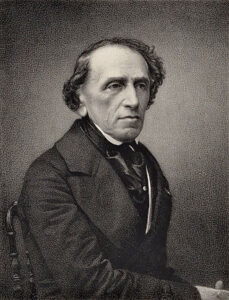By Alex Gordon


HAIFA, Israel — Giacomo Meyerbeer was the richest composer in history. His father was a banker and a prominent figure in the Jewish community in Berlin. Meyerbeer’s vast fortune and the great success of his operas, as well as his observance of the laws of the Jewish religion, set him apart from many musicians. He was a sponsor of many young composers, including Wagner, who “thanked” him with an antisemitic article, “Jewry in Music.”
He was a successful music manager who catered to the not-so-great tastes of the public and made a lot of money from his operas. French composer Hector Berlioz said of him, “He has not only the luck of being talented, but the talent of being lucky.” He was a very popular composer during his lifetime and almost forgotten after his death. Meyerbeer was born and raised in Germany, studied in Italy and worked in France. His music shows borrowings from German, Italian and French music. He changed his name to Italian, and the librettos of all his operas were written in French. Meyerbeer left behind a huge fortune, which was used to financially support talented musicians during the composer’s lifetime and according to his will.
Jacob Liebmann Behr was born into a Jewish family in 1791, in Tasdorf, near Berlin. His family then moved to the capital of Prussia. His father Yehuda Herz Behr was a very wealthy financier, industrialist (sugar manufacturer) and subcontractor to the Prussian army. He was an avid music lover and a regular concertgoer. His mother, Amalia (Malka) also came from the financial elite. In Amalia’s salon gathered the Berlin upper society represented by the best representatives of the sciences and arts. The future King Friedrich Wilhelm IV also appeared there.
The choice of Judaism as his religion was a personal decision of the twenty-year-old Meyerbeer. After the death of his maternal grandfather, the composer wrote to his mother in 1811: “Please accept my promise to always live according to the laws of the religion of which he was an adherent.” In his diary, the composer recorded the calendar dates of significant family events using the Jewish calendar rather than the Gregorian calendar. Jacob Liebmann Behr took the surname “Meyerbeer” after the death of his maternal grandfather, Liebmann Meyer Wolf, and the name “Giacomo” during his studies in Italy, around 1817.
Yehuda Behr was a leader of the Jewish community in Berlin (his house even had a synagogue, for a performance in which Jacob wrote a cantata). From 1803, Meyerbeer became one of the pupils of the Italian composer and pianist Muzio Clementi. The boy made his public debut in Berlin in 1801. The young pianist performed Mozart’s d-moll Concerto for Clavier. The general music newspaper (Allgemeine musikalische Zeitung) reported: “The terrific playing of the young Behr (a Jewish lad of nine), who confidently performed all the difficult parts of the solo part and has a fine power of execution very rare at his age, made the concerto even more interesting.” Meyerbeer’s first concert in Vienna caused a sensation. Professional pianists, including the baptized Jew Ignatz (Isaac) Moscheles, an Austrian virtuoso pianist and composer, ranked the “incomparable” Meyerbeer among the greatest virtuosos of his time. Jacob studied music theory and composition with Antonio Salieri.
In 1812, Meyerbeer’s opera Oath of Yiftach, based on a biblical story, was staged in Germany. This and the composer’s other early operas were not a success. On Salieri’s advice, he traveled to Italy in 1816 to study Italian opera. Giacomo’s name first became known internationally in 1824 after the Venetian premiere of his opera The Crusader in Egypt and its subsequent productions in London and Paris (1825).
Between 1827 and 1842 Meyerbeer lived mainly in Paris. In 1831, his first French opera, Robert the Devil, was staged. This opera brought him a resounding success. It was performed in all major theaters in Europe and the United States. At the Paris Opera it was shown over 700 times. The combination of dramatic music, melodramatic plot and the luxury of staging Robert the Devil, as well as cooperation with the famous French playwright and librettist Eugène Scribe, became a universal formula for a successful “grand” opera, which Meyerbeer followed in Huguenots, in The Prophet and in The African.
Meyerbeer’s operatic work was a new stage in the history of European opera. The composer is the largest representative of the style of “grand” opera, established on the stage of the French musical theater, the first work of which was Robert the Devil. “Grand” opera is a five-act production characterized by spectacular staging, featuring ballet, chorus and an enlarged orchestra, extravaganza, spectacular and… eclectic.
The Huguenots, a panoramic tragedy of religious violence, premiered at the Paris Opera in 1836 and was presented over a thousand times in the century that followed. Berlioz, Verdi, and Liszt called the opera a masterpiece. During the nineteenth century, these Meyerbeer operas held their own on the international stage, making him the most frequently performed composer in the leading opera houses of the nineteenth century. The triumph of The Huguenots confirmed Meyerbeer’s primacy on the stages of European theaters and prompted King Frederick-Wilhelm IV of Prussia to offer him the position of court Kapellmeister. Heine, a tribesman of the composer, responded to the work in this way: “The Catholics are fighting the Protestants, and a Jew is writing the musical accompaniment.”
Ivan Sollertinsky, a Russian music and theater critic who, according to composer Dmitri Shostakovich, knew more than 20 languages, wrote a brochure about Meyerbeer, which included these words: “Meyerbeer was undoubtedly a first-class musician and a major theater master. […] With seeming artistic unscrupulousness and to a certain extent unquestionable eclecticism Meyerbeer created in the musical theater his style of large, pompous opera with a characteristic dramaturgical composition and individual orchestral techniques. […] Meyerbeer became a symbol of the “art of Mammon,” the triumphant capitalist art and its mercantile underside. […] Meyerbeer the musician outlived Meyerbeer the businessman. […] Meyerbeer is Dumas the father in music, but incomparably more vivid, larger, more colorful, more talented.”
Meyerbeer first became aware of antisemitism apparently when his portrait, commissioned by his mother, was displayed at the Prussian Academy of Arts, but was subsequently removed on the basis that “no Jew should be allowed to defile the Academy’s hallowed halls.” Meyerbeer was envied as a rich man who had conquered the opera stage. He annoyed his colleagues and provoked antisemitic attacks against him. Remaining faithful to Judaism, Meyerbeer not only wrote operas on biblical subjects, but music for Psalm 92 and 12 other psalms. Jewishness remained for him a refuge from hostility. Even before his protégé Wagner became a raging antisemite, Meyerbeer wrote to Heine (1840): “Ninety-nine percent of the readers are antisemites. Therefore, they enjoy and will always enjoy antisemitism, if only it is presented to them skillfully enough.”
Meyerbeer died on May 2, 1864, in Paris. Rossini, coming to meet the composer at his apartment the next day, was shocked by the news and fainted. Meyerbeer was buried in the family crypt in the Jewish Cemetery in Schönhauser Allee in Berlin.
*
Alex Gordon is professor emeritus of physics at the University of Haifa and at Oranim, the academic college of education, and the author of 10 books.
His six Italian operas, his apprentice works in which he absorbed the style of Rossini, were composed to Italian librettos. He did not begin to set French ones until he moved to Paris and met Scribe. He was a powerful influence on the grand operas of Donizetti, Verdi, Ponchielli and Tchaikovsky. When they are revived today, critics may deplore them but audiences are thrilled. They still work.